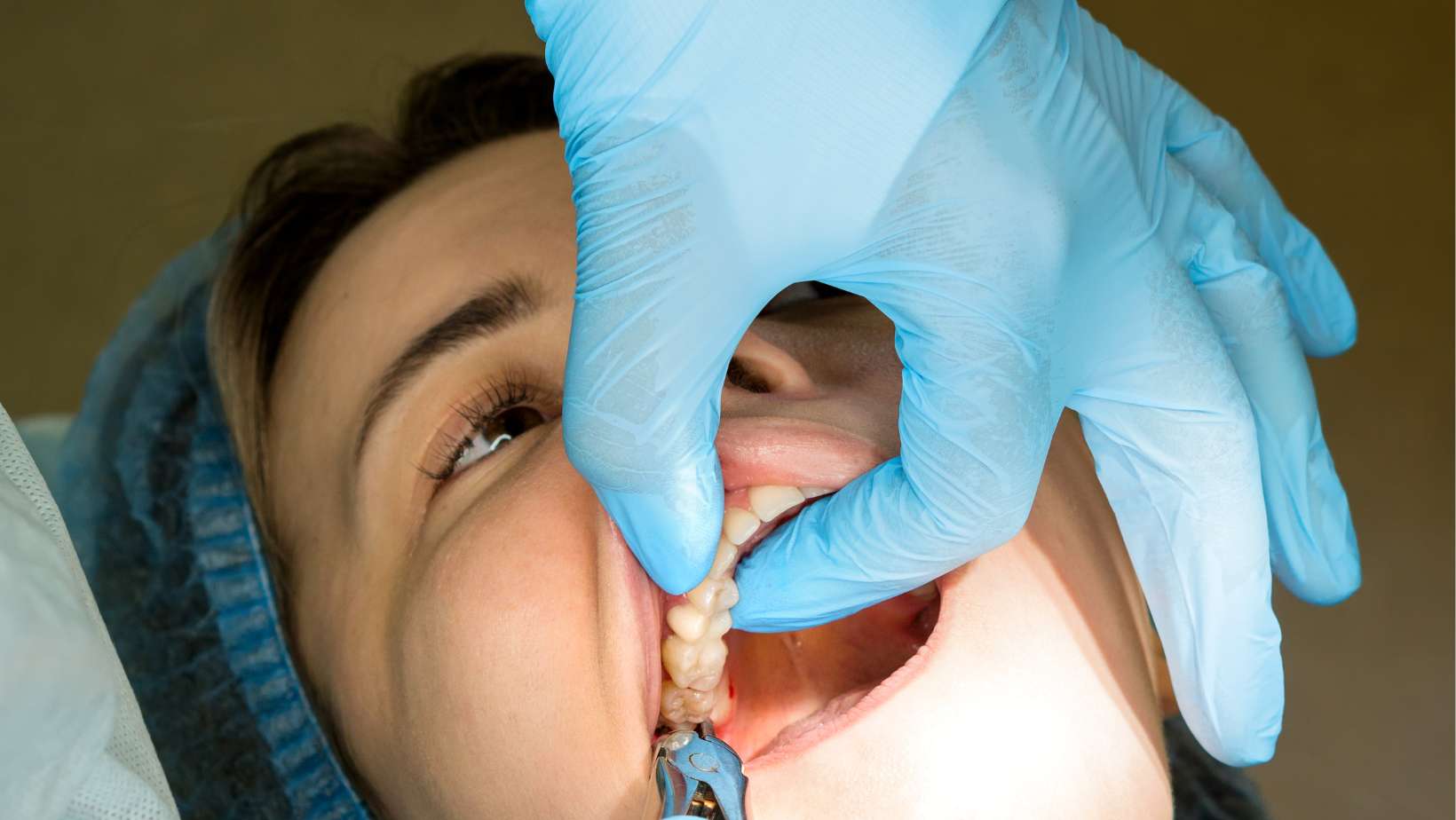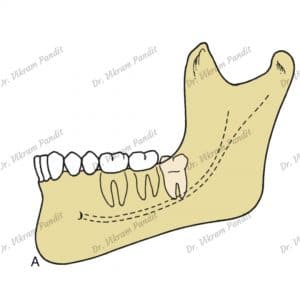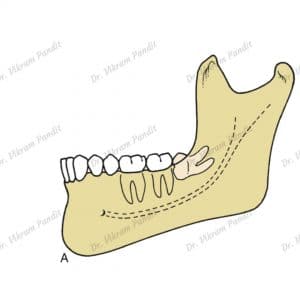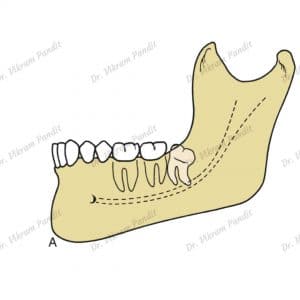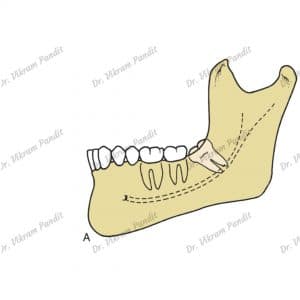Wisdom tooth extraction is a routine dental procedure, but knowing what to expect can make all the difference in your experience. Whether you’re about to undergo your first extraction or need a refresher on the process, this comprehensive guide will cover every aspect of wisdom tooth removal. From understanding the procedure and recovery tips to cost considerations and expert advice, we’ll ensure you’re well informed and prepared for a smooth journey through your dental surgery.
What is Wisdom Tooth, and How Can You Identify Their Arrival?
Wisdom teeth, also known as third molars or Akal Daad, are the final set of molars to emerge, located at the farthest corners of your jaw—two in the upper jaw (maxilla) and two in the lower jaw (mandible). Typically, these teeth begin to erupt between the ages of 17 and 25, a time often referred to as the “Age of Wisdom.” Their emergence can be an uneven process, with not all four teeth coming in at the same time.
Symptoms of Wisdom, Pain on the way
Pain and discomfort at the back of the jaw: This may be a sign that your wisdom teeth are erupting or causing other issues. Persistent pain could indicate an infection or impaction.
Swelling and tenderness: These symptoms can suggest inflammation around your wisdom teeth or an infection in the gum tissue.
Headaches: If you’re experiencing frequent headaches, it could be due to the pressure or tension caused by your wisdom teeth affecting the surrounding areas.
Gum infections: Infections can occur around partially erupted wisdom teeth, leading to pain, redness, and swelling. Prompt treatment is essential to prevent further complications.
Difficulty opening the mouth: This may be due to swelling or inflammation in the area of your wisdom teeth, making it challenging to open your mouth fully.
If you notice any of these signs, it’s important to see a dentist promptly to address any potential issues and ensure proper management of your dental health.
Why Wisdom tooth Removal Surgery May be Necessary: Understanding Impact and risks
Wisdom tooth removal surgery is a dental procedure where one or more wisdom teeth are extracted. The most common reason for this surgery is when the teeth are impacted, meaning they are trapped beneath the gum tissue and cannot erupt properly.
Impacted: wisdom teeth can grow in several problematic ways:
- Growing at an angle towards the neighboring tooth (second molar)
- Growing towards the back of the mouth
- Growing sideways within the jawbone
- Remaining trapped in the jawbone, even if they grow straight
Risks: Issues caused by impacted wisdom teeth include:
- Pain and swelling: These symptoms can occur due to inflammation and pressure from the impacted teeth.
- Dental infections: Impacted wisdom teeth can become infected, leading to pain and other complications.
- Potential damage to adjacent teeth or roots: Impacted teeth can exert pressure on neighboring teeth, causing damage or misalignment.
- Cysts or tumors in severe cases: In untreated cases, cysts can form around the impacted teeth and may develop into tumors, requiring more complex surgery.
How to prepare for wisdom tooth removal surgery beforehand?
As with any treatment, staying well-informed will assist you in getting the best possible results while also providing some much-needed peace of mind. Here are some recommendations that can help you prepare for surgery beforehand:
- Ask your oral surgeon about any questions or concerns you have: No matter how big or small your questions may be, feel free to ask them. Your oral surgeon is there to help and support you through this experience. Know more
- Avoid eating or drinking immediately prior to surgery: You will be given anesthesia to numb the treatment area. To avoid feeling nauseous or dizzy, it's recommended that you do not eat or drink anything for at least one hour before surgery if it is to be done under local anesthesia. Your oral surgeon will provide you with specific instructions on when to stop eating and drinking.
-
Stop taking certain medications: Certain medications such as clopidogrel and aspirin can increase bleeding. It's important to stop taking these before surgery to avoid any complications.
Before surgery, let your oral surgeon know if you're taking these or any other medicines. They'll inform you whether or not you can continue to take your current medicines (and when to stop these medicines) before surgery in preparation for it. We may have to consult your primary physician or cardiologist before recommending to stop the medicines.
Impacted teeth can also be painful and lead to dental infections. They may also crowd or damage adjacent teeth or roots. More serious problems may occur if the impacted tooth’s sac becomes filled with fluid and enlarges to form a cyst. As the cyst grows it may hollow out the jaw and permanently damage adjacent teeth, the surrounding bone, and nerves. Rarely, if a cyst is not treated, a tumor may develop from its walls and a more serious surgical procedure may be required to remove it.
Even if you don’t have any symptoms, your dentist may recommend wisdom tooth removal surgery to prevent future issues from developing.
How Wisdom Tooth Surgery Is Performed
Process of Wisdom Tooth Extraction: Wisdom tooth extraction involves several steps:
- Consultation and Evaluation
- Dental X-rays to assess the position and condition of the wisdom teeth
- Discussion of medical history and anesthesia options
- Preparation for Surgery
- Local or general anesthesia to numb the area
- Sedation options for patient comfort
Wisdom Tooth Extraction Steps: The extraction procedure typically follows these steps:
- Incision and Access
- Making an incision in the gum tissue to expose the tooth and bone
- Bone Removal and Tooth Sectioning
- Removing any bone blocking access to the tooth
- Sectioning the tooth into smaller pieces if necessary
- Extraction and Cleaning
- Removing the tooth and cleaning the site of any debris
- Stitching and Dressing
- Stitches to promote healing and applying gauze to control bleeding
What to Expect during wisdom tooth removal surgery?
Wisdom tooth removal is a common dental procedure, but knowing what to expect can help ease any anxiety you might have. Understanding the steps involved and the techniques used can make the experience smoother and more predictable. Here’s a detailed look at what typically happens during the surgery:
- Anesthesia: The procedure is usually performed under local anesthesia, which numbs the treatment area to ensure you do not feel pain during the surgery.
- Incision: The oral surgeon makes an incision in the gum tissue to expose the wisdom tooth and the surrounding bone.
- Extraction: The wisdom tooth is then removed. Depending on its position and condition, it may be extracted in one piece or broken into smaller pieces for easier removal.
- Advanced Techniques: At Pandit Clinic, we use a piezoelectric surgical device, especially for complex cases. This tool helps minimize complications and reduces the risk of nerve damage during the extraction.
- Cleaning and Closure: After removing the tooth, the surgeon cleans the area and closes the incision with stitches.
- Gauze Pack: A gauze pack is placed over the surgical site to help control bleeding. You should gently hold the pack in place without chewing on it.
What to expect after wisdom tooth removal surgery?
After wisdom tooth removal surgery, it’s normal to experience some swelling and discomfort. Your oral surgeon will give you specific instructions on how to manage these symptoms. There are a few things you can do at home to help speed up your recovery:
- Apply an ice pack: To help reduce swelling, apply an ice pack to the outside of your cheek for the first 24 hours after surgery.
- Take pain medication: Your oral surgeon will prescribe you pain medication to help manage any discomfort you're experiencing. It's important to take the medication as directed.
- Rest: It's important to get plenty of rest after surgery. Avoid any heavy or strenuous activity for at least 24 hours.
- Eat soft foods: Stick to eating soft foods for the first few days after surgery. Avoid extremely hot or spicy foods. Gradually add other foods back into your diet as you're able. Drink plenty of fluids to keep yourself hydrated.
- Brush your teeth gently: You can resume the toothbrushing from the next day of surgery, but be sure to do so gently. Avoid the surgical site when brushing.
Post-Extraction Symptoms: Common post-extraction symptoms include:
- Swelling and bruising
- Mild to moderate pain
- Bleeding and clot formation
Pain Relief for Wisdom Tooth: Effective pain relief strategies include:
- Over-the-counter pain relievers like ibuprofen
- Prescription medications if necessary
- Cold compresses to reduce swelling
Empty Tooth Treatment: Post-extraction, proper care is vital to avoid complications such as dry socket or infection. Treatments include:
- Keeping the extraction site clean
- Using prescribed medications
- Following aftercare instructions meticulously
Are there any risks or complications associated with wisdom tooth removal surgery?
As with any surgery, there are risks and complications associated with wisdom tooth removal surgery. However, these are usually minor and can be easily managed by your oral surgeon. Some of the common risks and complications include:
- Bleeding: After the pack is removed you may experience some bleeding. If so, follow these instructions:
- Fold a piece of clean gauze thick enough to bite on. Dampen the gauze with cold water and hold it on the extraction site for 1 hour without disturbing.
- Apply moderate pressure by closing your teeth firmly over the gauze pad. Maintain this pressure for 60 mins.
- Do not lick or suck on the extraction site.
- A small amount of blood might leak from the wound until a clot forms. Do not panic. However, if it is heavy bleeding contact your oral surgeon.
Here is how you can take care of the clot that will help heal your wound faster:
- Do not smoke, consume alcohol, drink with a straw or rinse vigorously for the next 72 hrs.
- Avoid aerated drinks or alcohol.
- Do not clean near the bleeding socket for the rest of the day. However, floss and brush other teeth thoroughly.
- Limit strenuous activity for the next 24 hrs.
- Infection: An infection can develop at the surgical site. To help prevent this, be sure to follow your oral surgeon's post-operative instructions carefully. If you experience any symptoms of an infection, such as fever, increased pain, or pus or drainage from the surgical site, call your oral surgeon right away.
- Dry socket: A dry socket is a condition that can develop when the blood clot at the surgical site is dislodged. Symptoms of dry socket include pain, bad breath, and an unpleasant taste in the mouth. If you think you may have a dry socket, call your oral surgeon right away. It takes few extra days for the dry socket to heal. With certain medicines and instructions, pain or discomfort due to dry socket can be minimized.
Wisdom Tooth Removal Cost Understanding
Understanding the cost of wisdom tooth removal can help you plan effectively and ensure a smooth experience. The overall expense can vary based on several factors, but it’s important to know that you’re investing in high-quality care and your long-term oral health.
Key Factors Influencing Cost:
- Type of Extraction: Simple extractions are typically more affordable compared to complex cases involving impacted or deeply buried teeth. Regardless of the complexity, Dr. Vikram Pandit and his team ensure that every procedure is performed with the utmost precision and care.
- Anesthesia: The choice of anesthesia whether local, sedation, or general can affect the cost. Local anesthesia is generally the most economical, while sedation and general anesthesia provide additional comfort and peace of mind during the procedure.
- Pre- and Post-Operative Care: Comprehensive care, including pre-operative consultations, diagnostic X-rays, and post-operative follow-up, is integral to the process. This ensures that you are well informed and supported at every step.
- Practice Fees: Different practices may have varying fee structures. At Pandit Clinic, transparency in pricing is a priority, ensuring you have a clear understanding of the costs involved.
Dr. Vikram Pandit and the team at Pandit Clinic are committed to providing exceptional care and value. They offer detailed cost estimates and work with you to make the process as seamless as possible. Investing in wisdom tooth removal with an experienced Oral and Maxillofacial Surgeon means receiving top-notch care and achieving the best outcomes for your oral health.
Benefits of wisdom tooth removal surgery
There are many benefits to having wisdom tooth removal surgery. Some of the more common benefits include:
- Reduced pain and discomfort: Wisdom teeth can cause a lot of pain and discomfort. Having them removed can help reduce this.
- Improved oral health: Wisdom teeth can crowd or damage other teeth. They can also be difficult to clean, which can lead to plaque buildup and an increased risk of tooth decay. Removing them can help improve your overall oral health.
- Easier eating: Wisdom teeth can make it difficult to chew food properly. Having them removed can make eating much easier.
Expert Tips from Dr. Vikram Pandit for Smooth Recovery
- Rest and Relaxation: Avoid strenuous activities for at least a few days.
- Hydration and Diet: Drink plenty of fluids and eat soft foods.
- Oral Hygiene: Gently brush your teeth and avoid the extraction site.
- Follow-Up Care: Attend all follow-up appointments to monitor healing.
These tips are recommended by Dr. Vikram Pandit, a specialist in Oral and Maxillofacial Surgery. If you have any questions or would like to learn more, feel free to contact us at +918805980048. We’ll be happy to help you.
You Might Be Interested In
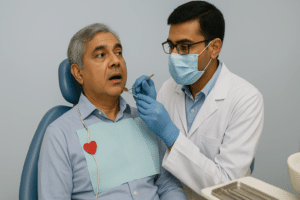
Dental Treatment for Patients who are going through Cardiac Diseases
Did you know that neglecting your dental health could put your heart at risk? Maintaining oral health is essential for everyone, but for adults with

Is Tooth Extraction Safe During Pregnancy?
Pregnancy is an extraordinary journey, filled with dreams of baby names and nursery decorations. However, amid all the excitement and anticipation, there are moments when

Tooth Extractions
Call us +91 88059 80048 A minor surgical procedure that involves wisdom tooth removal, fractured tooth removal, or infected tooth removal Home Oral and Maxillofacial

Corrective Jaw Surgery
Call us +91 88059 80048 Correction in jaw irregularities, and realignment of the jaws with teeth Home Oral and Maxillofacial Surgery Corrective Jaw Surgery RESHAPING







